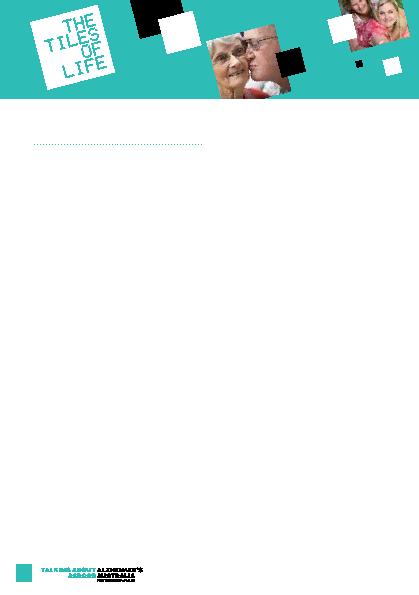
Alzheimer's Australia Tasmania
sinead Paine
Psychologist, Alzheimer's Australia Tasmania
Dr sarah elder
General Manager (Clinical Services),
Alzheimer's Australia Tasmania
catherine Meredith
Alzheimer's Australia Tasmania
cognitive rehabilitation that includes
individualised intervention as well as a
cognitive stimulation group. Individually-
tailored cognitive rehabilitation addresses
cognitive, behavioural, and emotional issues in
people with mild cognitive impairment (MCI)
or early to moderate dementia. Cognitive
stimulation groups offer opportunities for
social engagement and activities designed to
promote thinking, concentration and memory.
implementing such programs and issues in
program development. It will include a practical
demonstration and discussion of:
· program design
· outcome measures and assessment tools
· example exercises, tasks and strategies.
opportunity for participants to share their
own experiences and client outcomes in
working with people with dementia within a
rehabilitative framework.
Psychologist, Alzheimer's Australia Tasmania
sinead Paine
Psychologist, Alzheimer's Australia Tasmania
Dr sarah elder
General Manager (Clinical Services),
Alzheimer's Australia Tasmania
catherine Meredith
Alzheimer's Australia Tasmania
format involving facilitators from the cognitive
rehabilitation program at Alzheimer's Australia
Tasmania. Cognitive rehabilitation aims to
address the cognitive, behavioural, and
emotional issues experienced by people with
Mild Cognitive Impairment (MCI) and early to
moderate dementia.
rehabilitative interventions for people with
MCI and dementia in recent years, including
individual cognitive rehabilitation and cognitive
stimulation groups. A recent Cochrane review
suggested that cognitive stimulation has
benefits for memory and thinking. Broad
outcomes commonly reported in the research
literature indicate that improvements in quality
of life and wellbeing can be expected.
has been developing and implementing
a cognitive rehabilitation program in both
individual and group formats. Participants
attend individual cognitive rehabilitation for an
average of ten sessions and may then go on
to engage in group cognitive stimulation on an
ongoing basis.